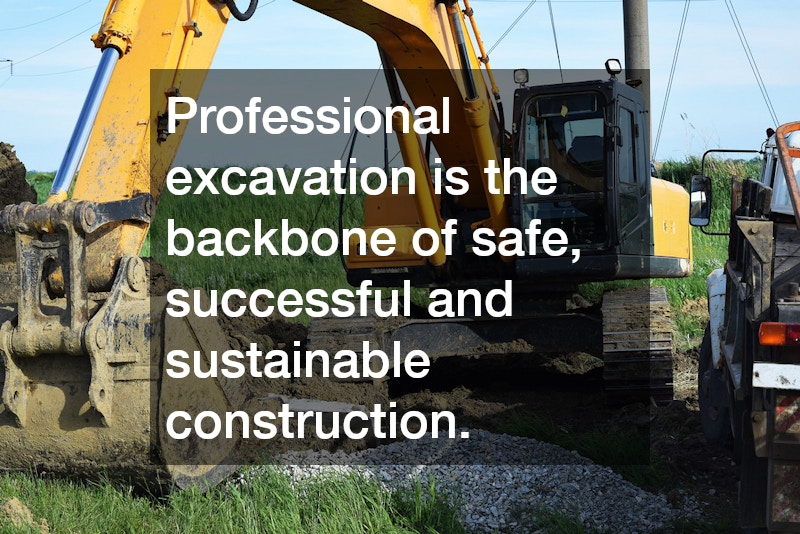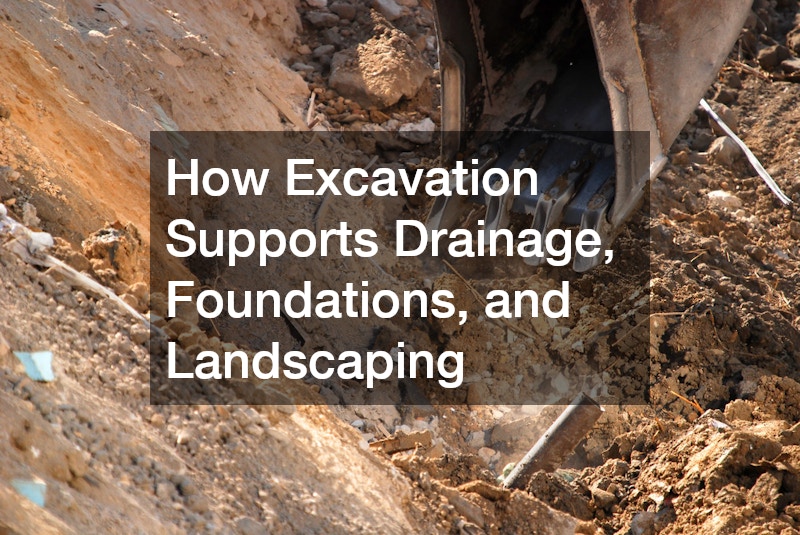How Excavation Supports Drainage, Foundations, and Landscaping
Excavation is one of the most important first steps in any residential or commercial construction project. Whether you’re building a new home, installing a drainage system or transforming a backyard, excavation provides the solid groundwork required for safety, performance and longevity.
When done correctly, it prevents structural issues, improves water flow and creates the right environment for landscaping.
In Australia’s varied terrain and climate, excavation needs to be carefully planned and professionally executed. A reliable excavation team ensures the land is properly prepared to meet building codes and environmental conditions.
Creating Stable Foundations
Every structure needs a strong and stable foundation. Excavation prepares the site by removing soil, rocks or debris that could compromise the build. It ensures the ground is level and compacted, reducing the risk of subsidence, cracking or movement later on.
Foundation work often includes digging trenches for footings, slab preparation and pier holes. These tasks must be completed with precision, as any error can lead to costly repairs or even structural failure.
Professional excavation contractors assess the site’s soil type and load-bearing capacity to choose the right depth and method. This tailored approach helps prevent long-term issues and gives builders a solid base to work from.
Improving Drainage and Water Management
Good drainage is essential for protecting buildings, gardens and driveways. Improper water flow can lead to pooling, erosion, flooding or foundation damage. Excavation helps shape the land to guide water away from structures and into appropriate channels.
This might involve grading the soil to create a slope, digging trenches for stormwater pipes or forming swales and pits for runoff collection. In urban areas, where space is limited, precise excavation ensures that drainage systems can be installed without damaging surrounding infrastructure.
In rural or sloped properties, excavation allows for advanced drainage planning that takes into account natural water flow and rainfall patterns.
Preparing the Ground for Landscaping
When landscaping a property, excavation ensures the space is ready for planting, paving and construction of outdoor features. Uneven or unstable ground can ruin the appearance and function of lawns, patios, garden beds and retaining walls.
Excavators level the area, remove excess material and shape the terrain for optimal aesthetics and usability. Whether you’re installing a pool, building a deck or creating a tiered garden, excavation lays the foundation for long-term success.
Soil conditioning and compaction also improve plant health and drainage in garden areas. Without proper ground preparation, landscaping elements may shift or deteriorate prematurely.
Enhancing Access and Infrastructure
Excavation supports access to essential services like water, gas, sewer and electrical systems. Trenching allows for safe and legal installation of underground utilities, with minimal disruption to existing structures or vegetation.
This process is especially important during renovations or property upgrades. Excavation makes it easier to integrate new systems into older homes while keeping them up to current standards.
Excavators also create access paths for vehicles and machinery during construction. These temporary roads prevent damage to finished surfaces and reduce delays caused by poor site access.
Managing Site Challenges
Australian properties often present excavation challenges such as rocky soil, tree roots, high water tables or steep slopes. Experienced contractors use the right equipment and techniques to manage these conditions safely and efficiently.
For example, vacuum excavation may be used near sensitive underground utilities, while rock breakers are employed on tougher terrain. Site-specific strategies ensure that excavation is completed without damaging the environment or neighbouring properties.
Safety is always a priority. Professional excavators follow strict protocols for equipment operation, site markings and underground service detection to avoid accidents and delays.
Compliance and Environmental Responsibility
Excavation must comply with local council regulations, zoning laws and environmental protections. This includes obtaining permits, managing erosion control and following guidelines for tree protection or soil disposal.
Licensed excavation teams handle these responsibilities, giving homeowners peace of mind that the work meets legal and environmental standards. They may also advise on sustainable practices such as reusing excavated soil or installing permeable drainage systems.
Responsible excavation not only supports the success of a project but also protects the local ecosystem and community.
Professional excavation is the backbone of safe, successful and sustainable construction. From building foundations and managing drainage to preparing gardens and installing services, excavation ensures that every project starts on solid ground.
By working with experienced contractors who understand the local landscape and regulations, homeowners can avoid costly setbacks and enjoy long-term benefits. Whether you’re starting a new build or upgrading an existing property, excavation provides the critical groundwork needed for lasting results.

